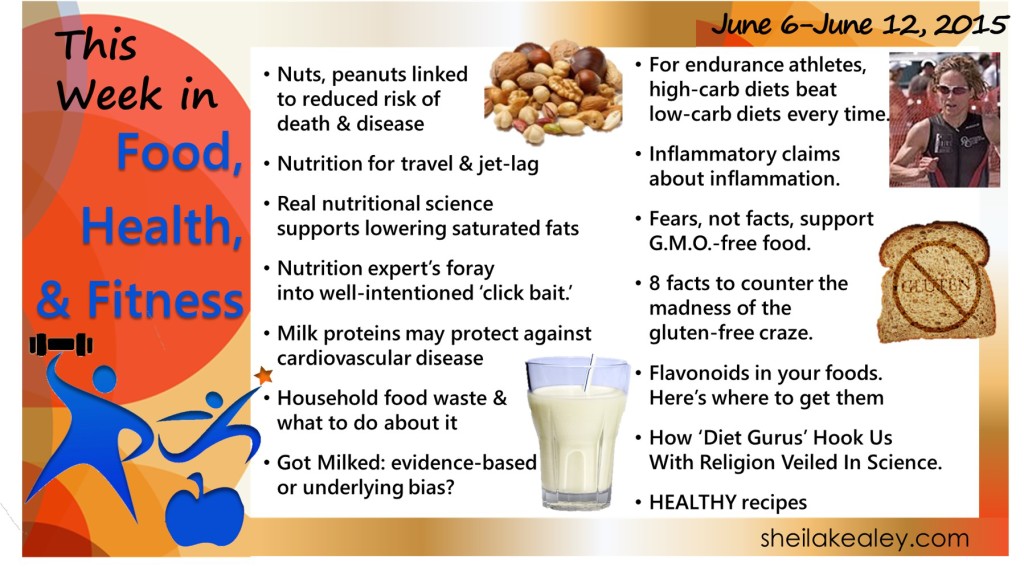This week, read about how green spaces make kids smarter, lifting heavy or light weights, gluten-free diets, how elite ultra runners fuel their performance, risks of drinking aloe vera, secret to Usain Bolt’s speed, supplement risks for athletes, and more.
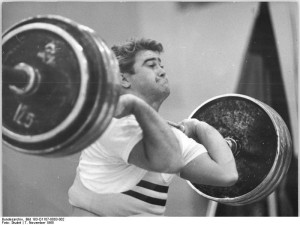 Why lift heavy weights if you don’t have to?
Why lift heavy weights if you don’t have to?
Research questions the dogma that heavy weights are necessary for increasing strength and building muscle. This week, Alex Hutchinson reports on a series of studies by Stuart Phillips of McMaster University, which have shown that light weights lifted to failure lead to similar gains as heavy loads, and that this holds true for recreational gym goers and well-trained athletes. In his studies, Phillips compared 3 sets of the standard loads chosen to induce failure between 8 and 12 reps to lighter loads (failure after 20-24 reps). Phillips believes that lighter loads might be a better option for older adults and those who aren’t comfortable with heavy weights because they are easier on joints, and could reduce potential injury. (Alex Hutchinson, Globe and Mail).
New Study: Most People Who Thought They Were Sensitive To Gluten, Weren’t
 This study followed 392 patients complaining of gluten-related symptoms for 2 years. Researchers concluded that self-perceived gluten-related symptoms are rarely indicative of the presence of non celiac gluten sensitivity, finding that 86% of patients who thought they were sentitive to gluten did not have celiac disease, a wheat allergy, or non-celiac gluten sensititivy. (Fanaticook.com reporting on Digestion, 30 May 2015).
This study followed 392 patients complaining of gluten-related symptoms for 2 years. Researchers concluded that self-perceived gluten-related symptoms are rarely indicative of the presence of non celiac gluten sensitivity, finding that 86% of patients who thought they were sentitive to gluten did not have celiac disease, a wheat allergy, or non-celiac gluten sensititivy. (Fanaticook.com reporting on Digestion, 30 May 2015).
This study corroborates other evidence showing that the vast majority of people who think they’re sensitive to gluten aren’t. The gluten-free trend is so common, that I’m sure everyone has someone telling them they feel better eating gluten-free. Why would this be?
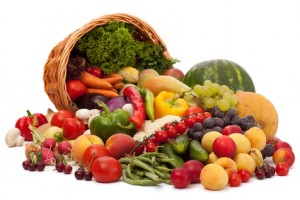
People who adopt a gluten-free diet often discover a variety of other healthy grains. Also, someone who adopts a gluten or grain-free diet could be eating better than their previous diet if they are replacing grains with more nutritious food choices. Most of these diets recommend limiting processed foods and refined carbohydrates and eating more fruits and vegetables, habits that can improve diet and health tremendously.
If a person notices health benefits after eliminating gluten or wheat, they will attribute the benefit to going gluten/grain/wheat free. But it’s almost impossible to attribute any benefits to the absence of a specific grain or gluten, since so many other dietary variables change with this elimination (overall calories, ratio of fat/carbohydrates/protein, fiber intake, dietary glycemic index, and intake of many other nutrients not related to a specific food).
 Also, when people pay more attention to food labels and to what they are eating, they are more likely to eat better and may lose weight; weight loss can lead to a host of benefits unrelated to gluten/grains/wheat (although most people attribute all benefits to eliminating a food). If you feel better after eliminating gluten, your new healthy habits likely don’t need to be at the expense of limiting a wide array of foods with known health-promoting properties. Read more about gluten-free diets here
Also, when people pay more attention to food labels and to what they are eating, they are more likely to eat better and may lose weight; weight loss can lead to a host of benefits unrelated to gluten/grains/wheat (although most people attribute all benefits to eliminating a food). If you feel better after eliminating gluten, your new healthy habits likely don’t need to be at the expense of limiting a wide array of foods with known health-promoting properties. Read more about gluten-free diets here
Should your diet be nutrient focused or food focused to promote health? A new study in college students showed that they believed that individual nutrients (e.g., potassium) were more important at preventing diseases than whole foods. As the AICR points out
A diet focused on whole, unprocessed foods will provide nutrients important for health, along with a a host of other protective compounds. (American Institute for Cancer Research)
 The secret to Usain Bolt’s speed may lie in synchronicity. A recent study suggests that running in step with competitor Tyson Gay might have helped Bolt’s world-record 100 meter sprint performance. (Journal of Experimental Psychology: Human Perception and Performance, February 2015)
The secret to Usain Bolt’s speed may lie in synchronicity. A recent study suggests that running in step with competitor Tyson Gay might have helped Bolt’s world-record 100 meter sprint performance. (Journal of Experimental Psychology: Human Perception and Performance, February 2015)
How do elite ultra-marathon runners fuel their performance? Although some long-distance athletes believe that low-carbohydrate eating is helpful because it might teach your body to “burn fat as fuel,” this study led by Trent Stellingwerff shows that the best ultramarathoners rely on a high carbohydrate diet to fuel their performance. This in line with current evidence-based research showing that high carbohydrate diets fuel fast performances in athletes. (International Journal of Sport Nutrition and Exercise Metabolism, May 2015).
Green spaces make kids smarter. Research on the benefits of green spaces continues to find benefits. A new study found that vegetation near schools not only decreases air pollution, but also protects the brain, boosting memory and attention in schoolchildren. The study showed that reductions in air pollution played an important role in the observed benefits. (The Atlantic, reporting on Proceedings of the National Academy of Sciences, June, 2015).
The risks of eating and drinking aloe vera. Just because something is “natural” doesn’t mean that it is safe. Although aloe vera is sold as a juice and added to foods, studies show that there is “clear” evidence that aloe vera extracts caused intestinal cancers in some animals when consumed. (Center for Science in the Public Interest).
Running on Empty. Overtraining syndrome is becoming more common in ultrarunners. (Outside Magazine).
Is it possible to drink too much water? Definitely, and drinking too much can lead to a dangerous condition called hyponatremia. (Gretchen Reynolds, New York Times).
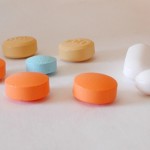 When vitamin supplements do more harm than good. Some athletes believe supplements will improve their health and help them recover. Anita Bean looks at recent research suggesting that some supplements can actually hinder the recovery process. (Anita Bean).
When vitamin supplements do more harm than good. Some athletes believe supplements will improve their health and help them recover. Anita Bean looks at recent research suggesting that some supplements can actually hinder the recovery process. (Anita Bean).
Smart Cooking Swap
Many people are deficient in important minerals like calcium, iron, potassium, and magnesium because they aren’t getting enough of these minerals in the foods they eat. Focusing your diet on whole, unprocessed foods is a good way to get more of these minerals. When it comes to fats, obtaining fats from whole plant foods rather than refined oils is considerably more nutritious.
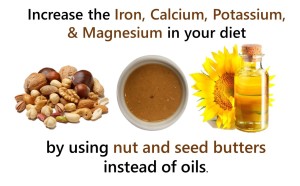 Oils are generally a healthier choice than butter or margarine because they contain healthier fats, but the extraction and refining process to produce oils eliminates fiber, protein, and minerals. For example, many health-conscious cooks are now using coconut oil (the “healthy” oil du jour), because they think it’s a nutritious choice (read more about coconut oil here). In reality, coconut oil adds plenty of calories with questionable health benefits, and no vitamins, protein, fiber, or minerals. It makes sense if coconut oil benefits the flavour or texture of your baked good, but you can do better if you’re trying to improve the nutrition!
Oils are generally a healthier choice than butter or margarine because they contain healthier fats, but the extraction and refining process to produce oils eliminates fiber, protein, and minerals. For example, many health-conscious cooks are now using coconut oil (the “healthy” oil du jour), because they think it’s a nutritious choice (read more about coconut oil here). In reality, coconut oil adds plenty of calories with questionable health benefits, and no vitamins, protein, fiber, or minerals. It makes sense if coconut oil benefits the flavour or texture of your baked good, but you can do better if you’re trying to improve the nutrition!
When it makes sense, substitute nut and seed butters for oils in your cooking, and you’ll benefit from more nutrients. Find out how. . .
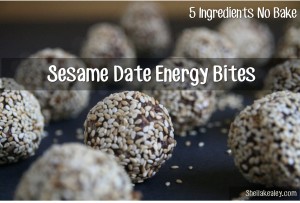 New Recipe: Sesame Date Energy Bites
New Recipe: Sesame Date Energy Bites
Here’s a recipe that athletes can use instead of commercial energy bars. The small portion size is just right, as it lets me doll out energy as I need for long bike rides, roller skis, or runs. These bites have a double sesame punch with sesame seeds and tahini (sesame butter): these little seeds are very nutritious and most often used as a garnish, so here’s a good way to take advantage of their superior nutrition. Go to recipe
Last Week in Food, Health, and Fitness
__________
Weightlifter Photo: Bundesarchiv, Bild 183-D1107-0003-002 / CC-BY-SA [CC BY-SA 3.0 de, via Wikimedia Commons
Usain Bolt Photo: Erik van Leeuwen [GFDL] via Wikimedia Commons
Share This: